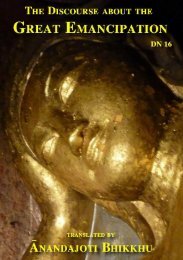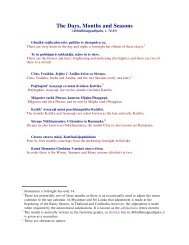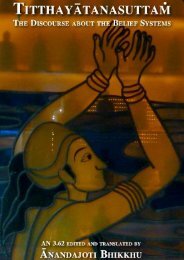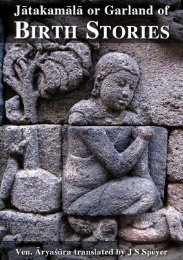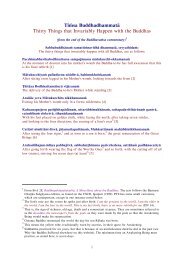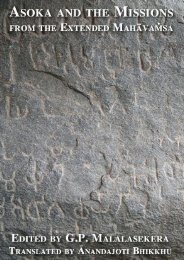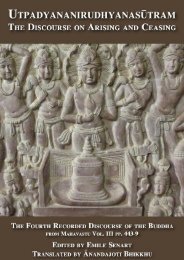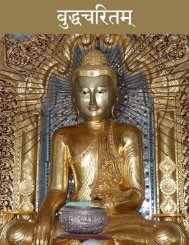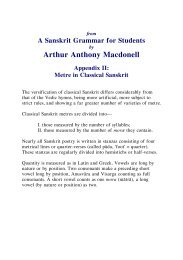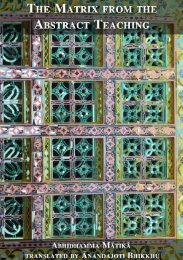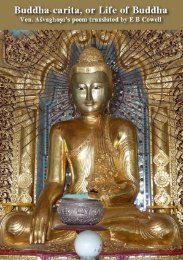CaturÄrakkhÄ Four Protective Meditations - Ancient Buddhist Texts
CaturÄrakkhÄ Four Protective Meditations - Ancient Buddhist Texts
CaturÄrakkhÄ Four Protective Meditations - Ancient Buddhist Texts
- No tags were found...
You also want an ePaper? Increase the reach of your titles
YUMPU automatically turns print PDFs into web optimized ePapers that Google loves.
1Caturārakkhā Bhāvanā<strong>Four</strong> <strong>Protective</strong> <strong>Meditations</strong>edited and translated byĀnandajoti BhikkhuBuddhānussati, mettā ca, asubhaṁ, maraṇassatiRecollection of the Buddha, friendliness, unattractiveness, and mindfulness of death -iti imā caturārakkhā bhikkhu bhāveyya sīlavā.these are the four protective meditations that a virtuous monk should develop.Anantavitthāraguṇaṁ guṇatonussaraṁ Muniṁ,Recollecting the Sage’s virtue, and his endless, extensive, good qualities,bhāveyya buddhimā bhikkhu Buddhānussati-m-ādito.the wise monk should develop the recollection of the Buddha first.BuddhānussatiRecollection of the Buddha(Ārakkhā Bhāvanā 1)1. Savāsane kilese so eko sabbe nighātiya,Alone he destroyed all the corruptions, and (bad) predispositions,ahū susuddhasantāno pūjānaṁ ca sadāraho.and being continually and fully pure he is worthy of worship at all times.2. Sabbakālagate dhamme sabbe sammā sayaṁ Muni° The Sage by himself has, in every way, completely awakened to all thingssabbākārena bujjhitvā, eko sabbaññutaṁ gato.throughout the whole of time, and alone he has arrived at omniscience.3. Vipassanādi vijjāhi sīlādi caraṇehi ca,° Being endowed with great psychic power, good conduct, virtue, and so on,susamiddhehi sampanno, gaganābhehi nāyako.true understanding, insight, and so on, the leader was like the shining sky.
Caturārakkhā Bhāvanā - 24. Sammāgato subhaṁ ṭhānaṁ amoghavacano ca so,He who never spoke foolish words, has arrived at that glorious state (Nibbāna),tividhassāpi lokassa ñātā niravasesato.he knew the threefold world system (completely) without leaving anything out.5. Anekehi guṇoghehi sabbasattuttamo ahū,Overflowing with countless good qualities he is supreme among all beings,anekehi upāyehi naradamme damesi ca.with countless skilful means he tamed those men who could be tamed.6. Eko sabbassa lokassa sabbamatthānusāsako,He alone, to the whole world was the teacher of everything good,bhāgyaissariyādīnaṁ guṇānaṁ paramo nidhī.he is the highest treasure, having qualities such as good fortune, mastery, and so on.7. Paññāssa sabbadhammesu karuṇā sabbajantusu,Being wise in regard to all things compassionate to everybody,attatthānaṁ paratthānaṁ sādhikā guṇajeṭṭhikā.he exceeded (others) in the best qualities, (knowing) what was for his own and others’good.8. Dayāya pāramī citvā paññāyattānam-uddharī,Through sympathy he set his mind on the perfections through wisdom he raised himselfup,uddharī sabbadhamme ca, dayāyaññe ca uddharī.he raised himself above all things, through sympathy he raised others too.9. Dissamāno pi tāvassa rūpakāyo acintayo,Even his visible form-body was beyond thought,asādhāraṇañāṇaḍḍhe dhammakāye kathā vakāti?what can be said of his spiritual body, which was unique, having powerful knowledge?
Caturārakkhā Bhāvanā - 3Mettā BhāvanāThe Development of Friendliness Meditation(Ārakkhā Bhāvanā 2)1. Attūpamāya sabbesaṁ sattānaṁ sukhakāmataṁ,In a similar way to oneself, all beings desire happiness,passitvā kamato mettaṁ sabbasattesu bhāvaye.having seen that one should gradually develop friendliness towards all beings.2. Sukhī bhaveyyaṁ niddukkho, ahaṁ niccaṁ, aham viyaMay I constantly be happy, free from suffering, and like myselfhitā ca me sukhī hontu, majjhattā cātha verino.may my benefactors be happy, neutral persons, and foes also.3. Imamhi gāmakkhettamhi, sattā hontu sukhī sadā,In this village, and its surrounding fields, may beings always be happy,tato parañ-ca rajjesu, cakkavālesu jantuno.and those in other countries, and people throughout the universe.4. Samantā cakkavālesu sattānantesu pāṇino,° Throughout the entire universe may the countless beings, creatures,sukhino puggalā bhūtā attabhāvagatā siyuṁ,persons, and bhūtas, who have attained individuality, be happy,5. tathā itthī pumā ceva ariyā anariyā pi ca,and so too (all) women, men, noble ones, and also ignoble ones,devā narā apāyaṭṭhā, tathā dasadisāsu cāti.gods, humans, and fallen creatures, and likewise (all beings) in the ten directions.
Caturārakkhā Bhāvanā - 4AsubhasaññāPerception of the Unattractive(Ārakkhā Bhāvanā 3)1. Aviññāṇasubhanibhaṁ saviññāṇasubhaṁ imaṁ,With consciousness it is unattractive, just as it is without (i.e. dead),kāyaṁ asubhato passaṁ, asubhaṁ bhāvaye yati.seeing this body as unattractive, a monk should develop (the recollection) of theunattractive.2. Vaṇṇasaṇṭhānagandhehi āsayokāsato tathā,Thus by way of colour, shape, smell, location, and appearance,paṭikkūlāni kāye me kuṇapāni dvisoḷasa.the thirty-two (parts) in my body (are like) repulsive corpses.3. Patitamhā pi kuṇapā, jegucchaṁ kāyanissitaṁ,The (parts) that depend on this body are contemptible, as is what falls from a corpse,ādhāro hi ’suci tassa, kāye tu kuṇape ṭhitaṁ.for their recepticle is impure, they are situated in this corpse of a body.4. Mīlhe kimi va kāyoyaṁ asucimhi samuṭṭhito,Like a worm in excrement this body arose in what is impure (i.e. the womb),anto asucisampuṇṇo puṇṇavaccakuṭī viya.inside it is full of impurities just like a full lavatory.5. Asucisandate niccaṁ yathā medakathālikā,Always the impurities overflow like fat (overflows) from a frying pan,nānākimikulāvāso, pakkhacandanikā viya.various kinds of worms dwell in it, the same as in a cesspool.6. Gaṇḍabhūto, rogabhūto, vaṇabhūto, samussayo,This bodily heap is like a boil, like a disease, or like a sore,atekiccho ti jeguccho pabhinnakuṇapūpamo ti.it is incurable, contemptible, just like a rotting corpse.
Caturārakkhā Bhāvanā - 5MaraṇānussatiRecollection of Death(Ārakkhā Bhāvanā 4)1. Pavātadīpatulyāya, sāyusantatiyā khayaṁ,By comparing a lamp in a breeze, with the destruction of the life continuum,parūpamāya sampassaṁ, bhāvaye maraṇassatiṁ.through seeing oneself as similar to others, one should develop mindfulness of death.2. Mahāsampattisampattā yathā sattā matā idha,Just as people who have attained great good fortune here have died,tathā ahaṁ marissāmi maranaṁ mama hessati.in the same way will I die death is (surely) coming to me.3. Uppattiyā sahevedaṁ maraṇaṁ āgataṁ sadā,Indeed death always comes along with that which has arisen,maraṇatthāya okāsaṁ vadhako viya esati.it is like a murderer who is seeking an opportunity to kill.4. Īsakaṁ anivattaṁ taṁ satataṁ gamanussukaṁ,° This life is slowly, without turning back, continually, eagerly,jīvitaṁ udayā atthaṁ suriyo viya dhāvati.going its way, it rises and falls just as the sun runs its course (and sets).5. Vijjububbulaussāva, jalarājī parikkhayaṁ,(Like) lightning, a bubble, dew, a line drawn on water, life (quickly goes to) destruction,ghātako varipūtassa sabbatthā pi avāriyo.like an executioner in regard to his rival (death) can never be constrained.6. Suyasatthāmapuññiddhī buddhivuddhī Jinadvayaṁ,Even the two kinds of Victors, who are famous, strong, meritorious, powerful, and ofgreat intelligence,ghātesi maraṇaṁ khippaṁ, kā tu mādisake kathā?were quickly slaughtered by death, so what to say about one like me?7. Paccayānañ-ca vekalyā bāhirajjhattupaddavā,When conditions fail there are internal and external adversities,marāmoraṁ nimesā pi maramāno anukkhaṇan-ti.dying at each and every moment I will die in less (time) than a blink of an eye.
Caturārakkhā Bhāvanā - 6AṭṭhasaṁvegavatthūniThe Eight Bases for Urgency1. Bhāvetvā caturārakkhā āvajjeyya anantaraṁHaving developed these four protections one should consider nextmahāsaṁvegavatthūni, aṭṭha aṭṭhitavīriyo.the eight great bases for urgency, having non-stop energy.2. Jātijarāvyādhicutī apāyā,Birth, old age, sickness, death, the lower realms,atīta-appattakavaṭṭadukkhaṁ,the past and future suffering in the round,idāni āhāragaveṭṭhidukkhaṁthe suffering in having to seek food in the present -saṁvegavatthūni imāni aṭṭha.these are the eight bases for urgency.3. Pāto ca sāyamapi ceva imaṁ vidhiñño,If, in the morning and in the evening, one who knows the way,āsevate satatamatta hitābhilāsi,who desires his own benefit, practises (these meditations) continually,pappoti so ti vipulaṁ hata pāripantho,° then after destroying (even) extensive obstacles, that sageseṭṭhaṁ sukhaṁ muni visiṭṭhamataṁ sukhena cāti.easily attains great happiness, and the distinction of the deathless.



